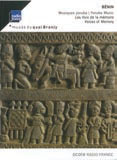Benin – Yoruba Music
Author: Martin Sinnock
View album and artist detailsAlbum and Artist Details
Artist/band: |
VARIOUS ARTISTS |
Label: |
Ocora Radio France |
Magazine Review Date: |
March/2012 |
This is a double CD of field recordings made in 1958, 1969 and between 1996 and 1999, lavishly pre¬sented like an illustrated book. The Yoruba are one of West Africa’s largest linguistic groups, the language being spoken by over 25 million in sub-Saharan Africa. This beautiful package is a thoroughly detailed exploration of the diversity of Yoruba singing and musical instruments. It specifically reflects the rich music of two sub-groups – the Isa and the Ife, located in Collines Province in the west of Benin bordering with Togo. There’s certainly some striking music on offer, with singing predominant on the first disc and with more instrumentation on the second. The beauty of the female choral singing is particularly astounding; stirring and atmospheric, it’s counter-balanced by some delightfully delicate children’s game songs sung in the round. A couple of funeral laments appear in two versions – one collected in 1958, the other in 1996. It’s fascinating to hear the differences, whilst still recognising the traditional sentiment.
The instrumentation is, in places, just as dramatic as the singing. The final track on the first disc features a driving talking-drum backed by an enthusiastic chorus. Most of the instrumentation is percussive in nature – drums, bells, rattles, xylophone, thumb piano, musical bow and some very sweet flute whistles. Despite the crudeness of the instruments’ construction, there is a remarkable sophistication in their tonality. The xylophone, for example, consists of either three or four crude logs freely perched across the players upper legs, with a gourd under the knees for resonation. The ‘keys’ are struck with pebbles or sticks and produce a surprisingly musical result.
The second disc features more extended instrumental passages, with vocal incantations, and it is here that the listener can detect the roots of more familiar modern Nigerian Yoruba music styles such as apala, fuji and juju. You’d probably need to have a specific interest in Yoruba music or culture to warrant splashing out on this package, but there’s a wealth of enjoyment to be had here.

